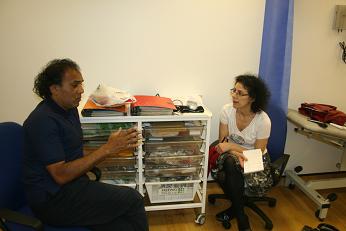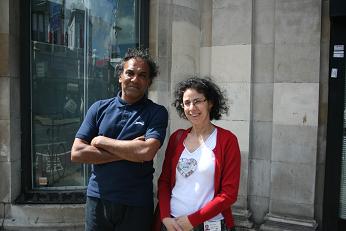Role shadowing three - Primary care alcohol and drug service - Jeff Fernandes and Maria Toufexis
 On 29 June 2012 the third Whittington Health role shadowing exercise took place with hospital based principle pharmacist Maria Toufexis visiting nurse consultant Jeff Fernandes at the primary care alcohol and drug service (PCADS), who offer support to patients suffering from substance misuse.
On 29 June 2012 the third Whittington Health role shadowing exercise took place with hospital based principle pharmacist Maria Toufexis visiting nurse consultant Jeff Fernandes at the primary care alcohol and drug service (PCADS), who offer support to patients suffering from substance misuse. The aim of this shadowing exercise is to allow Maria a greater understanding of the way in which drugs are prescribed to patients in the community and the impact this has on them as inpatients. Maria explains, “We have inpatients who use PCADS so it will be great to see how the service works from the inside.” This exercise is also beneficial as Maria is currently working on updating the hospital’s drugs guidelines.
Once we are at the centre, Jeff explains that his role is about more than just monitoring his patients’ drug and alcohol usage and prescribing drugs such as methadone. “Often, individuals who suffer from substance misuse have poor health generally. Their sole focus becomes taking drugs or drinking alcohol, and their health suffers as a result. Therefore, each week when I see the patients, I can assess their health and advise them in other ways, such as contacting their GP on their behalf, rather than just prescribing them their weekly methadone and leaving it at that.”
Jeff goes on to explain that locally figures for PCADS show that 52% of patient who engage well in treatment can stabilise and not use any illicit drugs on top of their prescribed medication.Jeff says “This is clearly a lot safer for the patient and allows their general health be monitored and improved.” Additionally, the national average is that 13 per cent of patients in substance misuse services will go right the way through the process and leave without relapsing or using even prescribed drugs.In PCADS this is higher but further research will verify this in 2012.
 Jeff sees four patients while we are at the centre, which allows Maria to gain a fundamental understanding as to how the service works, which can be implemented into ensuring that if a patient on prescribed drugs is admitted to hospital, they can be cared for appropriately. Maria says “Sometimes methadone users are admitted to the hospital, and this scheme has allowed me a deeper knowledge into how we can provide the optimum care for them.”
Jeff sees four patients while we are at the centre, which allows Maria to gain a fundamental understanding as to how the service works, which can be implemented into ensuring that if a patient on prescribed drugs is admitted to hospital, they can be cared for appropriately. Maria says “Sometimes methadone users are admitted to the hospital, and this scheme has allowed me a deeper knowledge into how we can provide the optimum care for them.”In line with our previous role shadowing exercises, one of the key elements that both participants get out of the session is the improved communication and contact between the hospital and community setting. Maria confirms “Sometimes on the wards we need advice about how best to handle a certain patients’ needs, following this role swap exercise, I can now point staff in Jeff’s direction or to the centre to get confirmation of a specific patients’ requirements.”
Jeff’s fourth and final patient highlights how important the service is in maintaining the overall health of the patients. Having been with Jeff for little over two minuets, the patient asks Jeff for advice regarding a completely separate health issue. Jeff asks the patient a series of questions before advising them to seek advice from their GP, confirming that the service can provide a valuable link between the patient and the appropriate care that they need outside of their substance misuse.
As Jeff’s final patient leaves, our third roll swap is complete having established a beneficial link between the hospital and the community; while also affording Maria a deeper understanding of the services available to patients outside of the acute setting. Jeff says “These exercises are beneficial because we know where we can sign-post patients to, we have a better understanding of what services are available and why they are better for specific patients, so it is a very worthwhile scheme.”
For more information about Whittington Health role shadowing, or to register your interest in taking part, please email communications.whitthealth@nhs.net or call Dave Moore on 020 7288 3001.
Last updated09 Jul 2012

